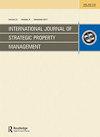Impact of Competitive Strategies on Market Entry and Growth in Emerging Economies in Japan
IF 2
4区 管理学
Q3 MANAGEMENT
引用次数: 0
Abstract
Purpose: The study sought to analyze the impact of competitive strategies on market entry and growth in emerging economies in Japan Materials and Methods: The study adopted a desktop methodology. Desk research refers to secondary data or that which can be collected without fieldwork. Desk research is basically involved in collecting data from existing resources hence it is often considered a low cost technique as compared to field research, as the main cost is involved in executive’s time, telephone charges and directories. Thus, the study relied on already published studies, reports and statistics. This secondary data was easily accessed through the online journals and library Findings: the study on competitive strategies in emerging economies in Japan revealed that cost leadership strategies facilitated successful market entry, while differentiation strategies promoted long-term growth. Strategic alliances with local firms were crucial for overcoming barriers, and early entry provided a competitive edge. Adapting strategies to Japan's unique cultural and regulatory context was deemed essential for success in emerging markets. Unique Contribution to Theory, Practice and Policy: The study recommends fosters a win-win scenario where foreign firms can thrive, and the host economy benefits from increased investments and job opportunities. Developing local talent and transferring knowledge to the local workforce is crucial for long-term growth. Both firms and governments should invest in skill development programs and knowledge transfer initiatives. Firms should prioritize hiring and training local talent, while governments can incentivize such efforts through grants and tax incentives. This practice-policy collaboration ensures that emerging economies can benefit not only from the capital but also from the knowledge and expertise brought by foreign firms.竞争战略对日本新兴经济体市场进入和增长的影响
目的:本研究旨在分析竞争战略对日本新兴经济体市场进入和增长的影响
材料与方法:本研究采用桌面方法学。案头研究指的是二手数据或不需要实地调查就能收集到的数据。案头调查基本上涉及从现有资源中收集数据,因此,与实地调查相比,案头调查通常被认为是一种成本较低的技术,因为主要费用是行政人员的时间、电话费和通讯录。因此,这项研究依赖于已经发表的研究、报告和统计数据。这些辅助数据很容易通过在线期刊和图书馆获得
研究发现:对日本新兴经济体竞争战略的研究表明,成本领先战略有助于成功进入市场,而差异化战略促进长期增长。与当地公司的战略联盟对于克服障碍至关重要,早期进入提供了竞争优势。将战略适应日本独特的文化和监管环境被认为是在新兴市场取得成功的关键。对理论、实践和政策的独特贡献:该研究建议建立一个双赢的局面,使外国公司能够蓬勃发展,东道国经济从增加的投资和就业机会中受益。培养本地人才并将知识传授给本地劳动力对长期增长至关重要。企业和政府都应该投资于技能发展项目和知识转移倡议。企业应该优先雇用和培训当地人才,而政府可以通过赠款和税收优惠来激励这些努力。这种实践与政策的合作确保了新兴经济体不仅能从资本中获益,还能从外国公司带来的知识和专业技能中获益。
本文章由计算机程序翻译,如有差异,请以英文原文为准。
求助全文
约1分钟内获得全文
求助全文
来源期刊
CiteScore
4.00
自引率
18.50%
发文量
23
审稿时长
15 weeks
期刊介绍:
International Journal of Strategic Property Management is a peer-reviewed, interdisciplinary journal which publishes original research papers. The journal provides a forum for discussion and debate relating to all areas of strategic property management. Topics include, but are not limited to, the following: asset management, facilities management, property policy, budgeting and financial controls, enhancing residential property value, marketing and leasing, risk management, real estate valuation and investment, innovations in residential management, housing finance, sustainability and housing development, applications, etc.

 求助内容:
求助内容: 应助结果提醒方式:
应助结果提醒方式:


